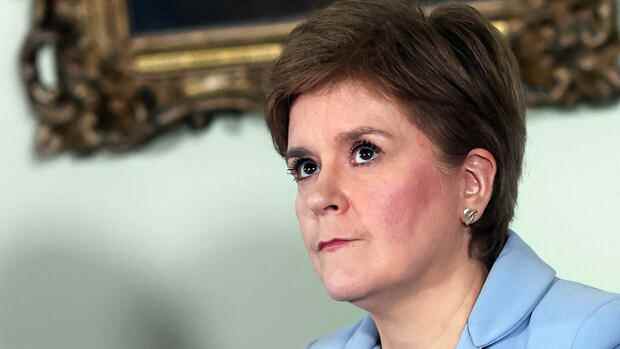Sturgeon had previously announced that he wanted to maintain Scotland’s exit from the United Kingdom regardless of the outcome of a case before the Supreme Court.
(Photo: dpa)
London A new independence referendum in Scotland is a long way off. The highest British court in London announced on Wednesday that the Scottish regional parliament has no right to schedule a referendum. Chief Justice Lord Robert Reed said: “The Scottish Parliament does not have the power to hold a referendum on Scottish independence.” However, the judges also rejected central government’s argument in London that it was too early to legislate for to hold a new referendum.
In doing so, the judges largely followed the arguments of the British government. Scottish Prime Minister Nicola Sturgeon originally wanted to push through a new referendum on independence in October 2023, but had announced that she would uphold the Supreme Court’s decision.
But then she wants to turn the next British general election into a quasi-referendum and only contest the election campaign of her Scottish National Party (SNP) with the demand for independence.
“A law that does not allow Scotland to decide its own future without the consent of Westminster debunks as a myth any notion of the UK as a voluntary partnership,” Sturgeon tweeted after the verdict. Democracy cannot be denied to the Scots.
Top jobs of the day
Find the best jobs now and
be notified by email.
“We must and we will find another democratic, legal and constitutional means for the Scottish people to express their will,” she said in Edinburgh .
Mood has not fundamentally changed
In your opinion, this can only be a choice. “The next national election coming up in Scotland is of course the UK general election, so this is both the first and the most obvious opportunity to seek what I called a de facto referendum back in June.”
Sturgeon’s SNP party is the strongest political force in Edinburgh’s regional parliament and co-governs with the Greens. In a first referendum in 2014, a majority of 55 percent of Scots voted to remain in the union with Great Britain.
Since then, according to the latest opinion polls, the mood has not fundamentally changed. For London, the question is thus decided in the long term. Prime Minister Rishi Sunak, like his predecessors Liz Truss and Boris Johnson, has rejected another referendum.
Sunak spoke of a “clear and final decision by the Supreme Court” and called on the regional government in Scotland to focus on solving the economic crisis.
There has already been an independence referendum in Scotland: in 2014 the majority voted for union with Great Britain.
(Photo: imago images/NurPhoto)
But Prime Minister Sturgeon argues that Brexit, which the Scots clearly rejected in 2016, has changed the situation. She wants to lead an independent Scotland back into the EU. In Parliament in Edinburgh, the pro-independence Scottish nationalists are in the majority.
With agency material
More: How Scotland’s Prime Minister wants to detach her country from Great Britain
